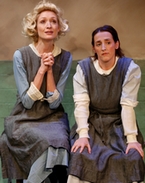
 |

|
HOME PAGE SITE GUIDE SEARCH REVIEWS REVIEW ARCHIVES ADVERTISING AT CURTAINUP FEATURES NEWS Etcetera and Short Term Listings LISTINGS Broadway Off-Broadway NYC Restaurants BOOKS and CDs OTHER PLACES Berkshires London California New Jersey DC Philadelphia Elsewhere QUOTES TKTS PLAYWRIGHTS' ALBUMS LETTERS TO EDITOR FILM LINKS MISCELLANEOUS Free Updates Masthead |
A CurtainUp Review
Airswimming
It is Jones' first play, a humdinger of a vehicle for the two fine actors — Aedin Moloney and Rachel Pickup — who remain an empowering and constant presence throughout. Moloney is the founder of the Fallen Angel Theater Company "committed to presenting the most outstanding and dynamic British plays written by an about women" — is producing this play in association with the Irish Rep. It has been a decade since Jones made a splash at the Manhattan Theater Club with her acclaimed play Humble Boy, and then in London and on Broadway authoring the libretto for the short-lived 2005 Andrew Lloyd Webber-David Zippel musical The Woman in White. It was a smart decision to confine (no pun intended) this short (seventy-five minutes) compact play to the Irish Reps more intimate space, where director John Keating''s sensitive staging brings the relationship of its two characters into sharp relief – giving an edge to a play buoyed more by characterization than by plot. Jones used "the true story of two women who, forgotten by their families, have been incarcerated in a hospital for the ‘criminally insane," as the basis for Airswimming.” Set in London beginning in 1924 and ending in 1972, the play spins in and out of the minds of its two characters Dora/Dorph (Moloney) and Persephone/Porph (Pickup), each learning the art of survival through the creation of a fantasy existence. In each case, it results in the birth of an alter ego. Unconventionally funny, without being insensitive to the frightful plight of two women who have been disavowed by their respective families, the play focuses on the times they spend together doing various chores over a period of almost fifty years. Neither has evidently ever been told what wrongdoing has brought them to this place. But adjust they must. They soon begin addressing each other affectionately as Dorph and Porph. At first, the "not so bright" and utterly bewildered Persephone is discomforted by the attention paid to her by Dora who has already acclimated herself since being committed two years earlier. Playing with time appears to be as much a part of the playwright's purposefully fragmented narrative as are the various stages of Dora's and Persephone's mental deterioration. It soon becomes quite clear that whatever were their original mental health, it is nothing like the certifiably insane state in which we find them in 1972 as the play comes to its chilling, but also heart-breaking conclusion. Irish Rep audiences will recall that Moloney and Pickup appeared together in the recent production of Dancing at Lughnasa. I was particularly pleased to see the tall, willowy, almost ethereally graceful Pickup, whom I remember also for her outstanding performance in Handicapped People In Their Formal Attire at Premiere Stages in New Jersey, create another unforgettable character. This is not to deny the impact of the gritty and garrulous character played by the shorter-in-stature Moloney. Pickup's Persephone and Moloney's Dora/Dorph are as distinct in their physical types as in their personalities, and not likely to have been either friends or even acquaintances in the outside world. In here, they become sensitized and responsive to the other, forging a touching dependency. Raised in an upper class family, the twenty-one year old Persephone's crime is having given birth out of wedlock while Dora's crime seems to have been her overtly masculine disposition and nature. Dora's admiration for the great historical and heroic women of history affords her many delightfully instructive digressions. Equally humorous is Persephone's idolization of 1950s film star Doris Day, an opportunity for her to don a blond wig and sing a few more snippets from the Day song-book than Dora cares to hear. The lack of traditional continuity with regard to the progression of events (not any) and transitions in their personalities (major) is the play's most essential element, but there are aspects of their interdependent, irrevocably entwined relationship that had me a bit confused, including no inference of any sexual intimacy. You have to work hard to think that what you are seeing may have occurred either before or after the scene you are currently watching. Keating's direction commendably affords both actors plenty of room to release their feelings and frustrations through their histrionic bouts as well as in the moments in which they face up to their situation, notably the intelligent Dora's wittily articulated sadness and in the naive Persephone's failure to comprehend what happened. The play's dramatic device to have time lose its purpose and meaning enables us to see Dora and Persephone obliged to forfeit their previous lives, indeed, their personalities in order to exist in a new world created out of their collective imagining. All of the action takes place in the green tile and cement walled utility room in the institution. Designer Melissa Sakun's bleak setting includes a tub, mops and brushes, a couple of benches, one cloudy window and a small print of a saint (Saint Dymphna) on the back wall. Not seen as much as examples of severe personality disorder brought upon by their decades-long ordeal, the action rather explores their emotional dependency. Their alter egos unwittingly become for them a last-ditch, life-supporting escape mechanism, just like the coordinated pretend swimming they do together. The result is an entirely fabricated reality — just like theater.
|
 Slings & Arrows- view 1st episode free  Anything Goes Cast Recording
Anything Goes Cast RecordingOur review of the show  Book of Mormon -CD Book of Mormon -CDOur review of the show  |